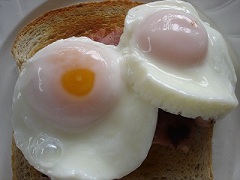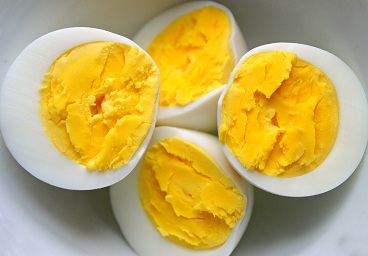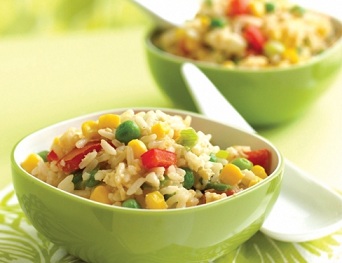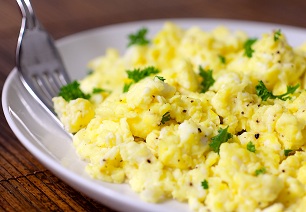 When can babies eat eggs? This is a great deal of confusion concerning when you can start giving your baby certain foods. When parents first start to give their baby solid foods, they frequently hear a long list of banished items such as eggs, nuts, citrus fruits, wheat, raisins and kiwis. In some cases, the advice for babies to avoid certain food depends on the circumstances such as a family history of allergies, but ends up becoming accepted as the common truth for all babies.
When can babies eat eggs? This is a great deal of confusion concerning when you can start giving your baby certain foods. When parents first start to give their baby solid foods, they frequently hear a long list of banished items such as eggs, nuts, citrus fruits, wheat, raisins and kiwis. In some cases, the advice for babies to avoid certain food depends on the circumstances such as a family history of allergies, but ends up becoming accepted as the common truth for all babies.
When Can Babies Eat Eggs?
Eggs are a great source of nutrients with six grams of protein as well as essential fatty acids, iron, zinc, calcium, folic acid, riboflavin, vitamin B12 and vitamin E all in only 75 calories. Eggs actually have the second highest quality protein found in any food, coming only after human milk which contains lactalbumin protein. Besides, there are also a variety of ways to prepare them. Best of all, eggs are easy to digest and chew. Because of all the advantages and nutritional benefits associated with eggs, many parents want to know when their babies can eat eggs.
The Health Canada Guidelines say that you can start adding foods that are rich in iron like whole eggs to your baby’s diet when the baby is six months old. This is actually the same age that you can start introducing meat alternatives such as meat purees. Foods rich in iron are essential for your baby’s growth, development and nutrition at this point. Despite that, egg whites are known to be a common cause of triggering allergies, leading many parents to delay the introduction of egg whites until their babies are twelve months. Today the advice is that you can offer the whole egg to your baby at six months old, you should always discuss this with your doctor first.
Things to Remember When Giving Baby Eggs
Keep in mind that some babies will be allergic to eggs, but around half of them grow out of this particular allergy by age three to five. This does mean, however, that you need to pay special attention and take care when starting to let your baby eat eggs.
Test If Your Baby Is Allergic to Eggs
The very first time your baby eat eggs, only give him a small amount of one or two mouthfuls - just to be safe. Also be sure to give eggs separate from other potential allergy-causing foods like fish, cow’s milk, and peanut butter, as this allows you to tell whether the eggs cause an allergic reaction. If your child does have an allergy to eggs, there will be a physical reaction fairly soon after he eats them and this may include:
- Swelling
- Rashes (hives)
- Watery, itchy eyes
- A sore throat
- A runny or itchy nose
Avoid Raw Eggs or Lightly Cooked Eggs
There is always a risk that raw eggs contain salmonella which could lead to food poisoning and as such, you should never give your baby raw eggs. When you cook eggs for your infant, be sure that the entire egg is firm. You should similarly avoid giving your baby anything that includes raw eggs like uncooked cake batter, homemade mayonnaise or ice cream, or desserts with raw eggs.
Buy Eggs with the British Lion Mark
Eggs that contain this mark are from hens vaccinated against salmonella, meaning that they are almost guaranteed to be safe from it. Despite this, you should still always fully cook eggs before giving them to your baby.
Store the Eggs Properly
- Keep them cool: Salmonella multiplies quickly at room temperature, so always be sure to select eggs at the store that were well-refrigerated and put them immediately in your fridge when you get home.
- Avoid storing eggs in the refrigerator door: Despite some fridges being designed with a spot in the door for eggs, you shouldn’t store them there. The U.S. Department of Agriculture says that you should keep your eggs in their original carton and store them in the coldest area of the fridge which should be 40 degrees Fahrenheit or a bit cooler.
Egg Recipes for Your Baby
You can make eggs in many ways including frying, boiling, poaching or scrambling. You could even share an omelet with your baby. The trick is to figure out which recipe your baby prefers and here are some ideas to get you started and your baby will love to eat eggs.
|
Egg Recipes |
How to Prepare |
|
Poached Eggs
|
Fill a saucepan with three inches of water, then heat it up until the water is gently simmering. Break a cold egg into a small saucer or dish. Hold the dish right above the simmering water and gently slip it in. Keep the water barely simmering until the yolk is hard cooked and the white is set which lasts about 5 to 8 minutes. Take the eggs out with a slotted spoon, then drain well. |
|
Hard-Cooked Eggs
|
Put cold eggs into a saucepan in a single layer. Cover them with an inch of cold water then cover the saucepan, bringing it quickly to boil on high heat. Take the pan off the heat and let the eggs stay in the water between 18 and 23 minutes. Drain the water and run cold water on top until the eggs cool. |
|
Microwaved Eggs
|
Whisk an egg with a tablespoon of breast milk or water or formula in a microwavable container. Cover it with plastic but leave a vent for steam. Microwave for a minute and 30 to 45 seconds. Cover and let stand half a minute to 1 minute so they finish cooking. |
|
Eggy Oatmeal Scramble
|
Whisk two egg yolks, then put a cup of cooked oatmeal and ¼ cup of soft cooked fruits or veggies in a warmed frying pan with olive oil. Add the whisked egg yolks and scramble. This can be a finger food when broken into pieces. |
|
Veggie Eggs & Rice
|
Combine 1 to 2 yolks of hard boiled eggs, a cup of brown rice (cooked), and ¼ cup diced or pureed soft cooked veggies, mix them well. You can also heat up a frying pan with olive oil, scramble an egg yolk and add rice and veggies. |
|
Egg Yolk Scramble
|
Crack an egg, separating the white and yolk. Warm up butter or olive oil in your frying pan, then scramble the yolk with whole milk, breast milk, formula or juice after mixing in a bowl. Constantly scramble until it's cooked thoroughly. |







